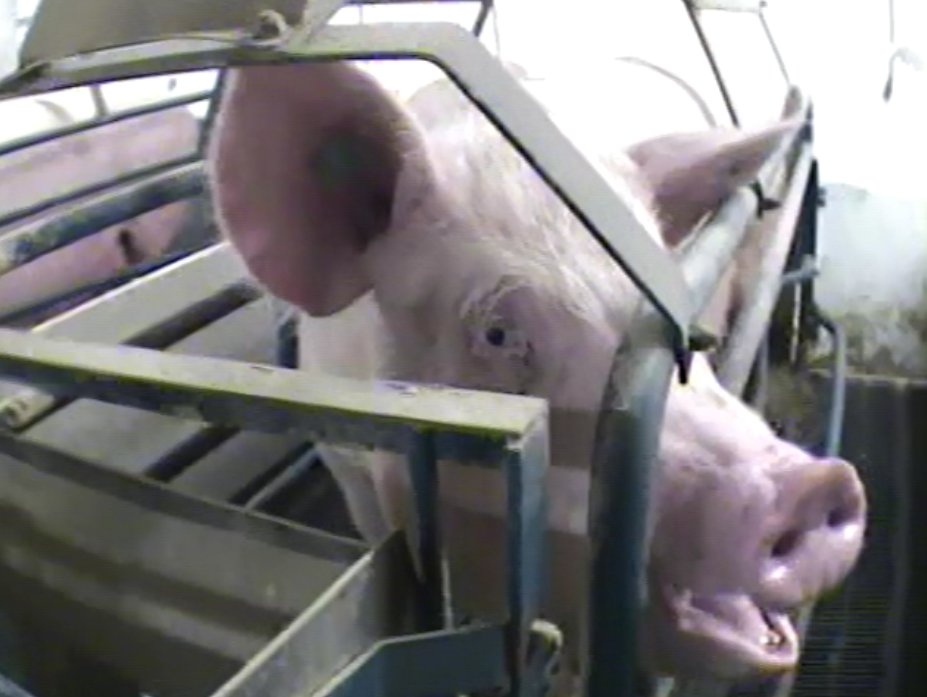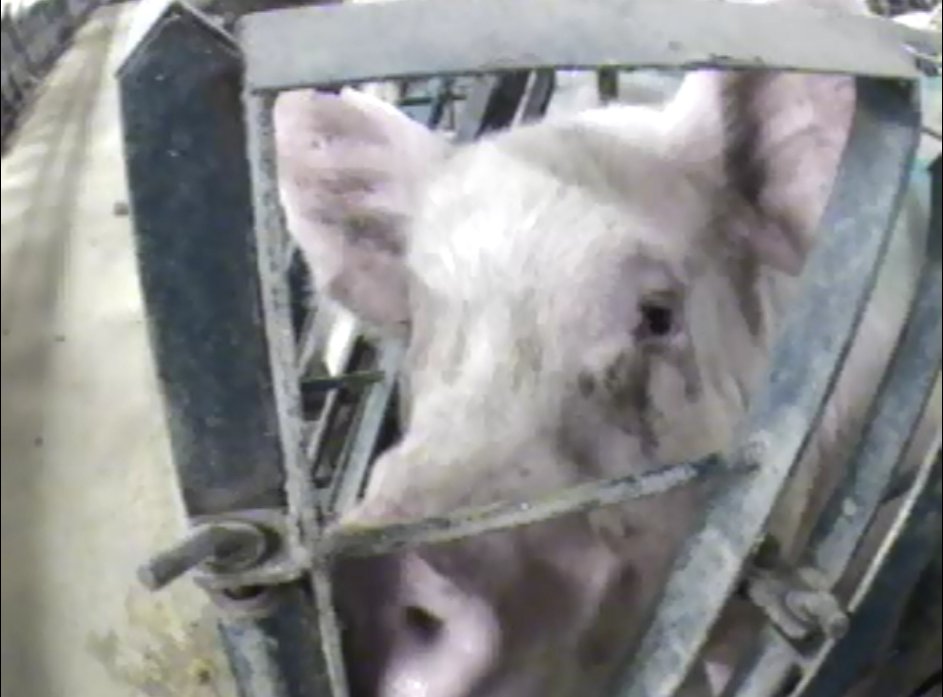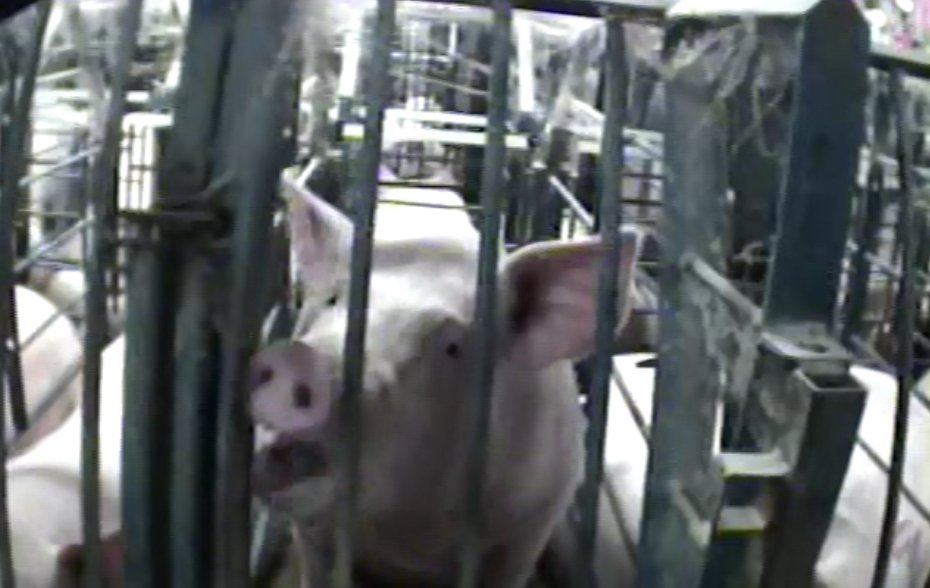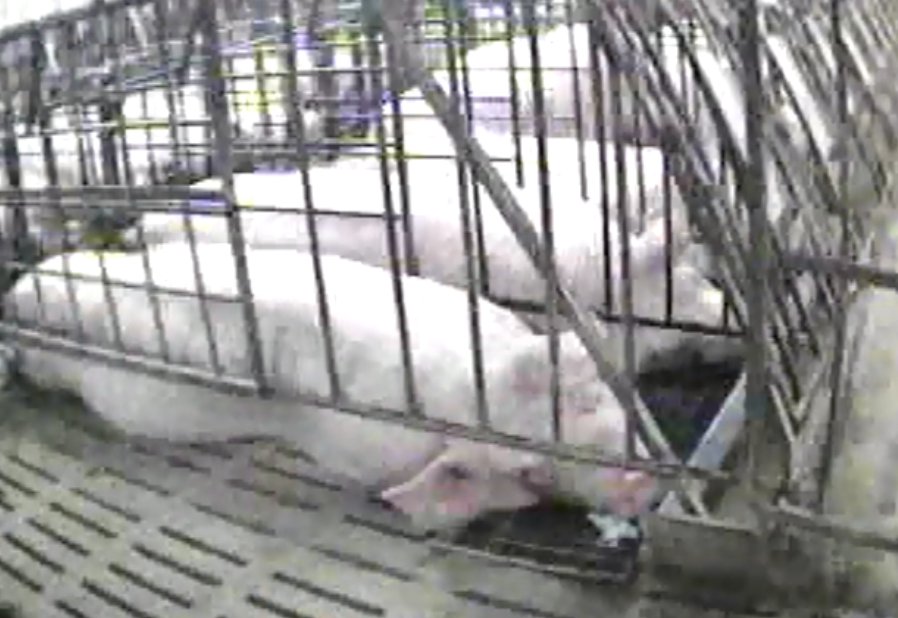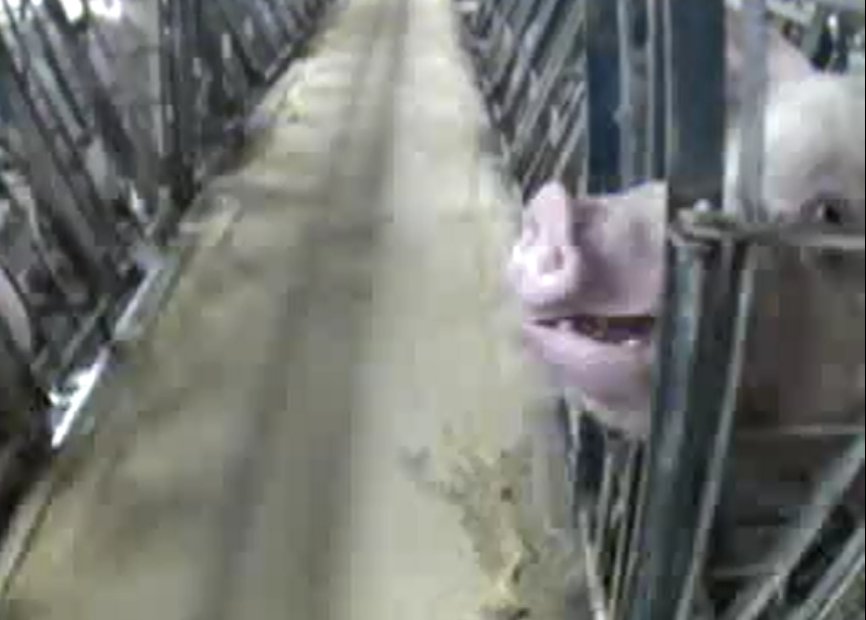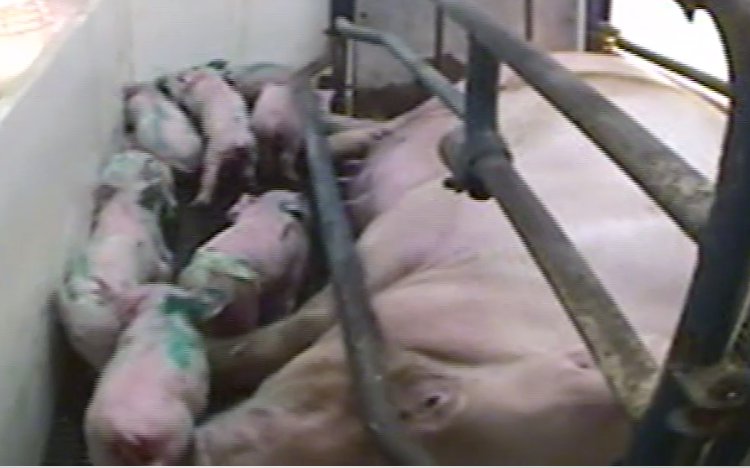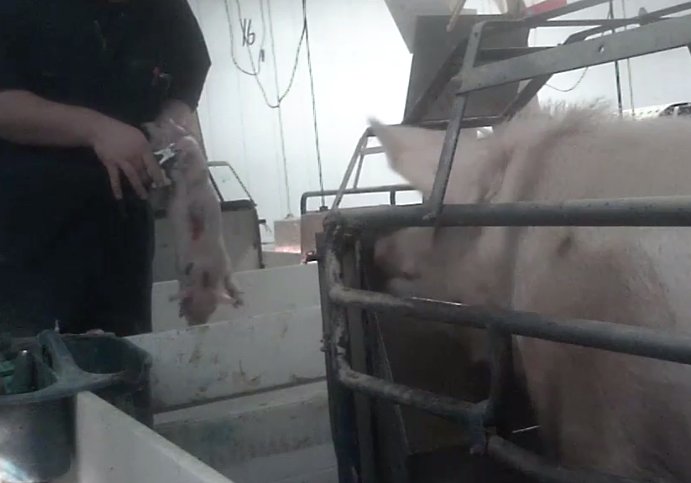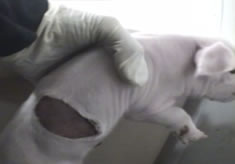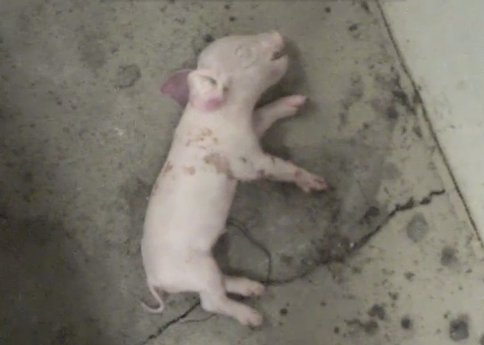Iowa Investigation: Hawkeye Sow Centers (Hormel Supplier)
Video | Photos | Gestation Crates | Castration | Ag-Gag | Press | Act Now | Donate
While employed at Hawkeye Sow Centers (HSC), a pig breeding facility in Leland, Iowa, an Animal Outlook investigator wore an undercover camera to document the day-to-day miseries forced upon thousands of female pigs—who are intensively confined in tiny crates where they can’t even turn around—and their piglets, who endure painful mutilations without any relief.
Iowa is the largest pork-producing state in the U.S. and, in 2012, animal agribusiness passed an “ag-gag” bill in the state to make whistleblowing exposés on factory farms, like this investigation, illegal. Our video sheds light on standard practices that the industry desperately tries to hide. Read more about this ag-gag bill, which was signed into law by Iowa Governor Branstad in early March 2012.
Piglets born at this facility will be slaughtered at around six months of age, and as our investigator was told, some of their meat will be marketed under the brand name Hormel. While Hormel recently issued a statement that its company-owned facilities will phase out gestation crates, it did not commit to extending this new policy to the hundreds of independently-run facilities that ultimately supply Hormel, like HSC, which comprise the majority of Hormel’s pork suppliers.
With the news this week that McDonald’s—one of the biggest buyers of pork in the U.S.—is moving to end gestation crate confinement of pigs in its U.S. supply chain, the writing for this inhumane practice is on the wall. It’s time for Hormel to extend its new gestation crate policy to all of its suppliers.
The daily miseries forced upon the pigs our investigator witnessed and painstakingly caught on camera in December 2011 represent pork industry norms. Cruel, yet standard practices include immobilizing breeding pigs in barren metal crates barely wider than their bodies. These smart and social animals are so intensively confined, they can’t even turn around, and they’re treated like mere piglet-producing machines. Artificially inseminated, they spend months inside these narrow gestation crates during pregnancy and are then moved to an equally restrictive farrowing crate where they’ll give birth and nurse their young through metal bars. After a few weeks, their piglets will be taken away and the process will start all over again. Gestation crates are so cruel, they’re already banned in the European Union (effective 2013) and are being phased out in eight U.S. states. Read more now and urge Hormel to take action.
As is industry norm, piglets are routinely mutilated – workers cut off their tails and rip out the males’ genitals – without any painkillers. These painful procedures are performed directly in front of their mothers who, unable to help the screaming piglets, repeatedly vocalize in obvious distress. The severed testicles and tails are left on the floor of the sows’ crates. Non-surgical castration alternatives are approved and available in the U.S. and have already been widely implemented in other countries due to welfare concerns.
Our investigation also uncovered:
- Poorly performed castrations that resulted in herniated intestines
- Workers pushing the herniated intestines back inside the piglets, then wrapping the area with tape
- Countless sick or injured piglets left to suffer without veterinary care, many of whom later died
- Sows languishing with uterine prolapses and later dying
- Forced cannibalism: The intestines of dead piglets are pulled out, turned into “gruel” and fed back to pigs
- Layers of feces caked on the floor of crates and filthy, fly-infested conditions
Animal cruelty is standard practice in this industry. More than 100 million pigs are raised and killed for food each year in the U.S. – and the most effective way each of us can help end this abuse is to simply leave pigs, and all animals, off our plates. Start today: Visit TryVeg.com.
“Castration is a painful surgical procedure.… The AVMA recommends the use of procedures and practices that reduce or eliminate pain.”
The American Veterinary Medical Association
Iowa Investigation Photos
Gestation Crates
More than 70 percent of the nearly six million female pigs raised for breeding in the U.S. are kept nearly immobilized for months on end inside narrow metal gestation crates that are barely wider than their bodies.
These sows are so intensively confined, they can’t even turn around. Unable to perform many of their most natural behaviors, these smart and social animals are treated as mere piglet-producing machines. They suffer both physically and mentally.
Experts widely agree that confining pigs in gestation crates causes immense suffering. Welfare concerns have already prompted the entire European Union (effective 2013) and eight U.S. states to phase out this barbaric system of confinement.
Several major U.S. companies are also moving away from the use of gestation crates, including Smithfield Foods and Cargill. Hormel recently announced that it will replace gestation crates with group sow housing at its “Hormel Foods-owned farms,” which is an encouraging first step, but this policy must be applied to all facilities ultimately supplying Hormel as well.
With the news that McDonald’s—one of the biggest buyers of pork in the U.S.—is moving to end gestation crate confinement of pigs in its U.S. supply chain, the writing for this inhumane practice is on the wall. It’s time for Hormel to extend its new gestation crate policy to all of its suppliers.
Painful Pig Castration
As is industry norm, piglets are routinely mutilated – workers cut off their tails and rip out the males’ genitals – without any painkillers.
Ag-gag Iowa – What is Agribusiness Trying to Hide?
Agribusiness interests in Iowa’s legislature have been feverishly working to pass “ag-gag” legislation — these are bills aimed at shutting down whistle-blowing exposés documenting the cruel and abusive conditions for animals on factory farms. Shamefully, Iowa’s governor signed this dangerous bill into law in early March 2012, rendering undercover investigations like this one essentially impossible and giving the public an even smaller window into the truth about how food is produced.
By going to such desperate lengths to prevent Americans from seeing what hidden cameras capture on film behind closed doors, Iowa’s agribusiness industry has proven that it in fact has something to hide: The truth.
Perhaps now more than ever, it’s imperative for us to empower ourselves and stand up for the billions of farmed animals who suffer, day after day, as they are routinely treated as mere meat-, milk- and egg-producing machines. Please watch and share our undercover videos with as many people as possible.
Be sure to also read more about “ag-gag” efforts in other states – and join our efforts today to speak out for animals.
Press
- Cruelty Exposed at Iowa Factory Farm Care2 Feb. 25, 2012
- Undercover investigation reveals abuse at Hormel pork supplier This Dish Is Veg Feb. 21, 2012
- Spam Makers Under Fire Over Sows Meat Trade News Daily Feb. 17, 2012
- Animal rights group releases pig farm video Des Moines Register Feb. 16, 2012
- New video shares livestock treatment footage Quad Cities Online Feb. 16, 2012
- Hog Farm Abuse Exposed KAAL-TV Feb. 16, 2012
- Another Animal Care Video Released KTIC Radio Feb. 16, 2012
- Animal welfare group releases undercover video of Hormel supplier facilities Minneapolis Examiner Feb. 16, 2012
- IA Lawmakers Target Farm Videos Through Fraud Approach Statehouse News Online Feb. 15, 2012
- ANIMAL TREATMENT: An animal rights group released undercover video Wednesday of what it calls cruel treatment of pigs at an Iowa hog confinement facility WHO-TV Feb 15, 2012
- Animal rights group releases video they say shows conditions at Iowa farm Des Moines Register Feb. 15, 2012
- Whistleblowing Expose Reveals Cruelty at Iowa Pig Breeding Factory Farm and Hormel Supplier Sacramento Bee Feb. 15, 2012
- North Iowa Hog Farm the Center of Undercover Abuse Video KIMT-TV Feb. 15, 2012
- Animal activists unveil new undercover farm video as lawmakers aim to limit practice Iowa Politics Feb. 15, 2012
- Capitol Digest 2-15-2012 Eastern Iowa Government Feb. 15, 2012
- COK Exposes Pig Abuse VegNews Feb. 15, 2012
- Compassion Over Killing Video Exposes Iowa Gestation Crate Cruelties Vegan.com Feb. 15, 2012
- Iowa Farm Bureau’s Hidden Camera Hypocrisy Vegan.com Mar. 28, 2012
Act Now
Act Now to Protect Pigs
Animal Outlook’s undercover factory farm investigations uncover the cruel and inhumane treatment of farmed animals. These realities are purposely kept hidden from the public behind the closed doors of animal agribusiness.
Here are some other ways to you can speak out for pigs and other farmed animals:

